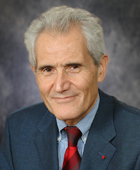
Dr. Alain Bensoussan, Ashbel Smith Professor of Operations Management and director of the Jindal School’s International Center for Decision and Risk Analysis, has been selected by the Society of Industrial and Applied Mathematics (SIAM) to receive an award for his contributions in the fields of differential equations and control theory.
He will be awarded the 2014 W.T. and Ida Reid Prize in Mathematics at SIAM’s annual meeting, to be held in Chicago in July. Inducted as a Charter Fellow of SIAM in 2009, Bensoussan is a leading expert in stochastic control and risk management. He presently is focused on an emerging field of research that studies individual decision-making within large populations.
The SIAM award selection committee said it wished to recognize Dr. Bensoussan for his “fundamental contributions in partial differential equations, deterministic as well as stochastic, including applications in filtering, stochastic and impulsive control, optimal stopping, variational inequalities and mean field game theory.”
Besides $10,000 and an engraved medal, the annual prize carries a request that the honoree deliver a lecture at the annual meeting.
In 2013, Bensoussan was awarded a $339,570, three-year grant from the National Science Foundation to study mean field game theory. The research seeks to explain, model and ultimately make predictions about behavior.
The term ‘mean field” refers to a physics concept that attempts to describe the effect of an infinite number of particles on the motion of a single particle. Researchers began to apply the concept to social sciences in the last decade to study how an infinite number of factors affect individual decisions.
Mean field game theory has the potential for many applications, Bensoussan says, from predicting traffic outcomes in order to prevent accidents to gauging the impact of new technology. Using the example of cloud computing, Bensoussan says that a decision to use cloud computing can be influenced by many factors, such as whether others use it to the point that it becomes a business necessity.
The theory also may help explain economic phenomena, Bensoussan says. The long-accepted equilibrium theory holds that the market forces of supply and demand bring an economy to a point of equilibrium. But Bensoussan says that equilibrium theory fails to explain the recent economic crisis. “We need new theory. If mean field can provide something in that direction, it would be useful.”
His NSF project is recapped in a mathematics brief, Mean Field Games and Mean Field Type Control Theory (New York: SpringerBriefs; 2013) , written with co-authors Jens Frehse of the University of Bonn and Philip Yam of the Chinese University of Hong Kong.
